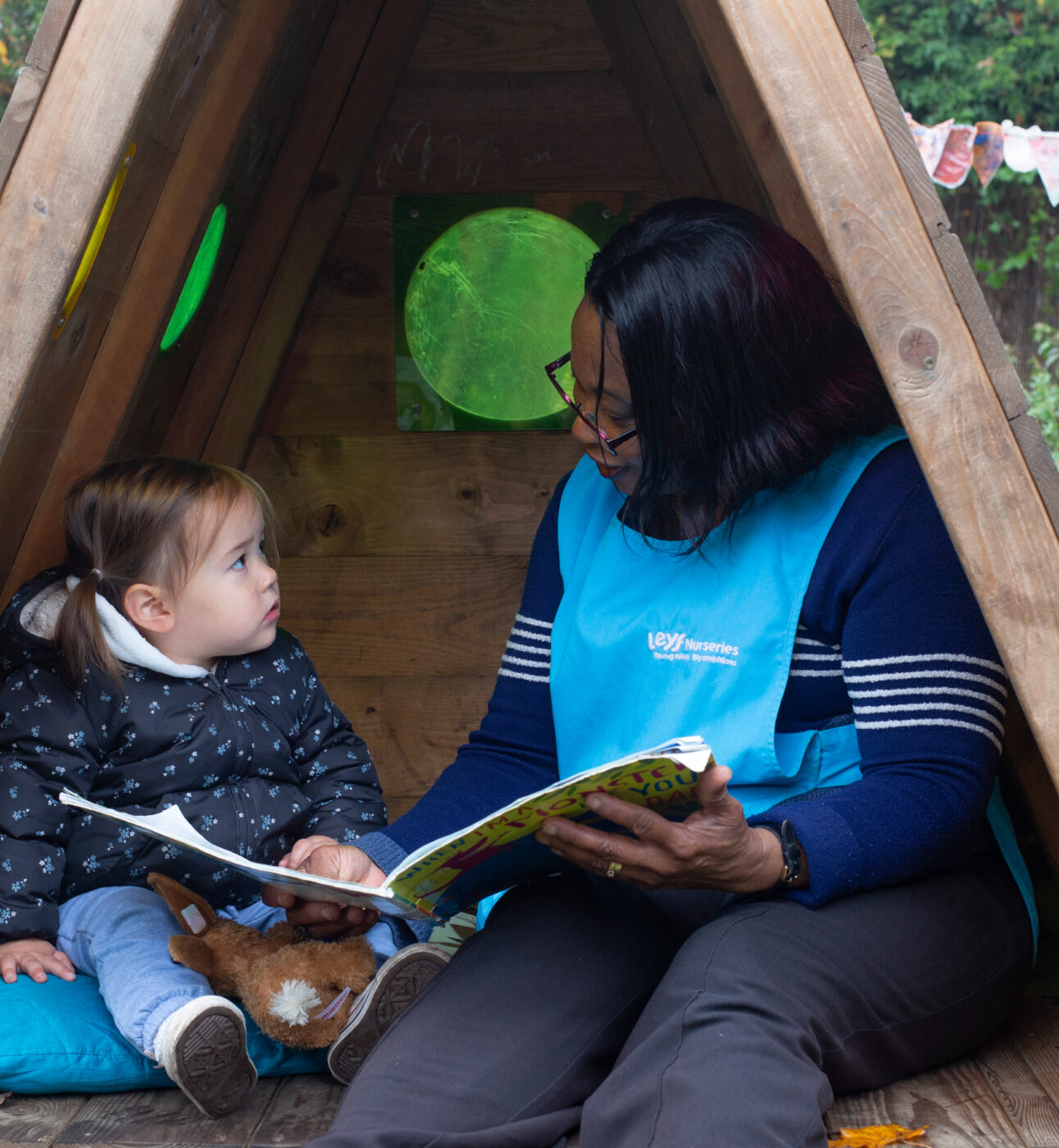
Talking Early Years: In conversation with Greg Bottrill
Are children deprived of the opportunity to play?… …is not a new question, but one that continues to be tackled on many levels. Greg Bottrill’s book ‘Can…
April 28th 2014
The London Big Conversation was hosted last week at LEYF and an informed and lively audience greeted three inspectors.
Led by Debbie Jones, Regional Director for London and National Lead for Social Care accompanied by Jane Wotherspoon, an HMI with National Lead for EYFS and John Kennedy, a London Senior HMI.
This blog does not follow the exact pattern of the meeting but reflects notes taken by LEYF colleagues and comments from Simona McKenzie. I have also included comments from Ofsted’s John Kennedy (displayed in separate text boxes below.)
We welcomed them to what we anticipated would be an energetic dialogue and began by thanking them for listening so far and making some changes such as complaints led inspections no longer immediately triggering a full inspection and the options for judgements to go up as well as down. We also noted some positive inspections we had recently with humane, informed and listening inspectors.
Some positives:
|
We set the scene and agreed the meeting would be a mutually respectful and constructive conversation. Examples to illustrate concerns would be open but there would also be space for the Ofsted trio to feel able to respond, challenge and comment within an agreed level of discretion and frankness.
| Notes are summary notes of some key points. Text in italic indicates a comment from Ofsted during the discussion. The notes are grouped into key points for ease of reference.
Key foci for the discussion were signalled by the facilitator included:
Ofsted representatives indicated that should there be questions they cannot answer, they would take they away for a response. |
The group was shy for the first ten minutes but soon warmed to the theme.
The first question focused on the practice of conducting inspections when the nursery manager is on annual leave. This is causing concern especially for small settings where the manager is a lynchpin. Suggestions included minor adjustments to the diary function on the SEF where managers can note absences etc. Ofsted will check this out as an option but no promises.
| Managers being on leave during an inspection. Ofsted was asked to consider what arrangements could be put into place to enable providers to indicate when managers are on leave, so that this could be considered by Ofsted when programming inspections. This was particularly important for a small setting where the manager was key. It was felt that the situation relating to providers was different to other settings such as schools, as they were not open all year round and leave dates were known in advance. One suggestion was to consider if a diary function could be set up to signal manager’s planned leave. We will bring this back for consideration but cannot promise anything re timing of inspections. |
Unsurprisingly, we spent a fair amount of time on the complaints procedures. A key issue remains the length of time it takes to go through the procedure and the distress this causes. We are still miffed that Stage 1 of complaining about a judgement or an inspector is investigated by the contractors themselves and it has to reach Stage 2 before it goes to Ofsted where there was a feeling that there was more chance of a fairer hearing. That said the number of complaints about the judgements overturned was depressingly low.
Sarah Steel from Old Station Nursery group was interested in Ofsted’s view about how we claim compensation when we have a complaint upheld but which has taken six months to achieve. The details to apply are buried very deep in the Ofsted website, a point conceded by Ofsted. We also reiterated our dissatisfaction that reports are posted on the website with no message to indicate to readers including parents that the report is being contested.
| Complaints – There seems to be a high proportion of complaints that are not upheld and the process seems very long. It would also be helpful to have a flag on the website indicating to parents when a provider was complaining about an inspection, given the delay in the report being published.
We are looking into the whole area of complaints to identify what improvements can be made. Some concerns were expressed about complaint-driven inspections where the complaints may be fuelled by other factors e.g. ex staff. It was felt that there needs to be an ‘intelligent way’ to consider complaints and decisions about inspections. Providers made the point about the serious implications which can result from complaints-triggered inspections where a provider is not allowed to work. Some providers felt that they should know who made the complaint. There are limitations on what can be divulged in order to protect anonymity. We look carefully at complaints to separate out those which may have little substance from those, for example, which relate to safeguarding and where an inspection is essential. Some asked about compensation when a complaint has been upheld and why there did not appear to be anything very easy to access on Ofsted’s website about compensation for providers. A question was asked about a specific case and the importance of not having a significant gap between a complaint coming to Ofsted and an inspection report being published so that parents are made aware without undue delay of specific issues relating to a setting so that they can be informed before placing their children there. A comment was made that it would be helpful to have an appeal process as there seems to be no way to question inspection findings other than making a complaint. Point was made about online complaints and that it was not possible to send in other evidence. The complaints process should involve contact with a provider and providers should be able to submit additional evidence to support their complaint |
There was a reoccurring theme throughout our three hour meeting that many inspectors were poorly trained and that the sector had a real lack of faith in Tribal.
A question was asked about whether Tribal QA did their own work? Ofsted explained that they do random sampling checks and look at the match between the report and the evidence. They address issues when they find reports that are not fit for publication usually through performance management and more training for inspectors. Attendees at the meeting suggested that the process required more transparency and rigour if it was to have credibility, a view shared across the sector.
| Quality of inspectors. A number of concerns were expressed about the quality of training of Tribal inspectors. These concerns were not expressed about non-ISP inspectors working internally in Ofsted. The inconsistency raises questions about credibility.
A number of specific examples were given where providers believed that newer inspectors’ judgements on compliance-related aspects, legal issues, regulations were open to question. It was felt that training was focussing on pedagogy, communication, language, literacy etc. Individual concerns regarding some experiences of inspection included:
Some childminders find it hard to challenge inspectors. Some also commented positively on their experience of inspection and particular inspectors. A point was made that it could be better for a provider to have the same inspector A question was asked as to why local authorities could not be given the responsibility for undertaking the inspections of childminders. Ofsted is placing high priority on a number of key points in relation to inspection practice (a) the quality of training; (b) ensuring an accurate match between evidence and judgement and (c) ensuring consistency. |
| Regulations about managers. View that Ofsted should be discussing regulations about managers with the DfE. Point was made about social care background of a person. You could potentially have a situation where you employ a disqualified person. |
The debate led on to a comment about the high number of complaints-led inspections:
‘Brought forward ‘inspections triggered by safeguarding issues and malicious and vexatious anonymous complaints. There was a general view that not addressing this in a proportionate way will skew the balance of fairness and justice as there is no comeback on the complainant but the nursery or childminders can have their business and reputation ruined when this occurs. There were some graphic examples to highlight this including disgruntled staff members with a grudge. Neil Leitch, CEO of the Pre School Learning Alliance noted that 69% of complaints triggered by parents were by parents with debt and fee issues. Ofsted say they are looking carefully to understand vexatious complaints balanced against issues of safeguarding but in the meantime safeguarding is a priority and inspections will be brought forward if there are any issues that suggest children are unsafe or at risk.
We discussed the issue of Improvement with Ofsted and agreed that the regional structure was better as they could get a better grasp on local issues and respond more quickly through local seminars and good practice examples on the website.
| Communication and Ofsted’s website. Some felt that there are issues in getting through to Ofsted and also that the website is not as good as it could be. General feeling that it was not easy to navigate. We recognise that more needs to be done to improve this area. We drew attention to the good practice area of Ofsted’s website – some new examples were put on it last week |
There was quite a conversation at this stage with colleagues from the local authority and the challenge they face with depleting teams to meet the needs of improving setting that are judged ‘requires improvement.’ The general consensus was that by not supporting settings continuously, policy means we are shutting the gate after the horse had bolted.
| Improvement and moving to ‘good’ A view was expressed that the timescale expectation for a provider to move from ‘inadequate’ to ‘good’ was too short. There have been some ‘getting to good’ pilot seminars and the responses to these have been positive. We have listened very carefully to local authority concerns. We will not be carrying out improvement visits to providers routinely as we do in schools. Instead, we will be visiting / discussing with local authorities what is happening in a local area to drive improvements. It is important to stress that we are not taking over the local authority role. A local authority representative indicated that the LA welcomed the annual early years visits that used to take place.
We are now looking at developing getting to good seminars at a regional level. A question was asked as to why childminders were not included in the pilots. This was because non-domestic settings were the focus of the pilots. There was a general anxiety expressed by some that childminders feel undervalued and that changes relating to childminding agencies will move them further away from Ofsted. Some expressed the view that Ofsted / DfE should consult childminders more. |
Catriona Nason asked about sleep rooms. She wanted clarification as to whether we need sleep rooms, the rules about closed doors and supervision. Ofsted referred to the statutory requirements which do not specify the need for sleep rooms. Each setting had to risk assess what they felt worked best for them, given their context, and kept children safe.
Childminders were disappointed they had not been part of the pilot of the ‘getting good seminars’ and queried whether this was a deliberate means of excluding them. There were comments as to whether Ofsted intend to de-regulate childminders but Ofsted shrugged this off and did not give a firm answer. A more specific question was posed by Simona about why are inspectors interpreting the variations differently and why are some childminders being downgraded for continuity of care? Why are inspectors saying there is no such thing as 4 under 5s? Why has overlap not been dealt with as our Minister had promised she would address this as CMs were more likely to have these than any other provider? Why is the ratio for childminders in 3 paragraphs compared to pages and pages for others in both EYFS 2012 and 2014? Ofsted said they would examine this but reminded us that they were independent and regulated against the Department of Education standards.
| Emphasis given to childminders. Some were of the view that not enough focus is being given to childminders in the framework / guidance. The framework is a DfE issue rather than something that Ofsted is directly responsible for |
LEYF Head of Compliance asked about delegating responsibility of the nominated person especially with regards to the management of safeguarding investigations known in the sector as LADOs. Ofsted have agreed to check this.
Ofsted were surprised when we asked why reports were taking up to five months to arrive. We had quite a few examples in the room. Ofsted will explore this as Tribal have KPIs and one is a 15 day target to issue reports. Childminders asked if they would extend the 24 hours to agree the report as it’s easy to miss this especially if you are a CM who may not look at emails for 24 hours.
We all agreed that the website needs improving. It’s complicated and the alerts are unreliable. Ofsted agreed that this is on their radar for improvements.
| Late publication of reports. Late arrival of some reports, for example, a 4.5 month delay |
| Reports. There have been some delays in reports being published. Examples were given of a 4 or 5-month delay. Timescales are set out for the publication of reports and are part of the KPIs (key performance indicators) for Tribal, for example, for schools – so delays have implications for these KPIs. It was also felt that a 24-hour turnaround time for some providers can be unhelpful and it would be more helpful to have slightly longer – e.g. 48 hours. There is also on occasion a mismatch between the feedback during the inspection and what is then written in the report. A question was asked as to why the local authority does not get an inspection report before it is published on the website. |
We asked if the contracts will be brought in house next year when the contract period is up. We did not really expect an answer but said that in the spirit of good commissioning we would be happy to help them frame the next contract. Currently, Dee Gasson is reviewing the regulations in order to make sure the principle of regulars working with those they regulate is embedded. They are framing this within a report written in 2007 by Deloitte. Colleagues from the Independent Childminding trade association are currently advising on the Regulators Code. Ofsted will update us on progress
| Regulator Code of Practice. A question was asked about how far Ofsted has got in implementing the 2007 Regulator Code of Practice in helping to reduce complaints and ensure fair, proportionate and accurate regulation. A meeting has taken place with the Principal Officer Early Years Ofsted regarding this. This work is ongoing. |
Finally, we asked what Ofsted mean by teaching. They referred to the published ‘Evaluation schedule’ updated in November 2013 which contains a definition of teaching but noted our comments given our anxiety about the variations in inspector’s judgements. To help give us a steer my next blog will address this very issue!
| Teaching and framework changes. Question was asked about what is teaching and what inspectors are looking for. The grade descriptors are the key. Question about further changes to the inspection framework following proposed changes to the EYFS framework. We don’t anticipate substantial changes to the inspection framework in September – there will be some tweaks. Question was asked about sleep rooms. The key is what the statutory framework says and importance of a common sense approach to the context |

Are children deprived of the opportunity to play?… …is not a new question, but one that continues to be tackled on many levels. Greg Bottrill’s book ‘Can…

Launching the Reading Rights Summit in Liverpool Last week, Booktrust (where I proudly serve as a Trustee) hosted the Reading Rights Summit. We were joined by special guests, the…

A Right to be Children: The Importance of the Design Architecture Good architecture combines…